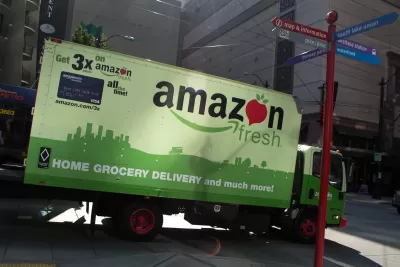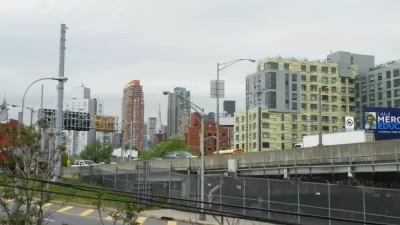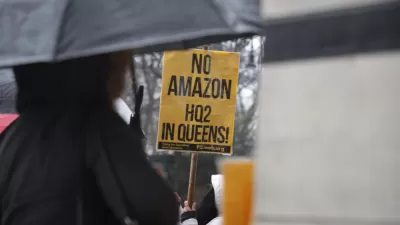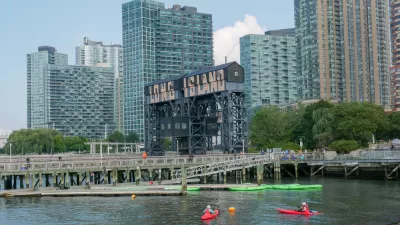Amazon is placeless. The company doesn't have a physical presence, create jobs, or pay taxes in most of the places where it does business — and it's having a profound impact on the health of cities and towns, a new report finds.

As Amazon upends the longstanding relationship between commerce and place, it's also increasingly threatening the revenue streams and social capital that cities and towns depend on to function, finds a new report from the Institute for Local Self-Reliance. Among the report's findings are:
- Amazon's rise has played a key role in the wave of retail vacancies and dying malls that's sweeping the country. By the end of 2015, Amazon's growing market share had caused more than 135 million square feet of retail space to become vacant, ILSR's analysis estimates.
- Property taxes are the largest single source of state and local revenue to fund schools, roads, libraries, and other services, and a disproportionate share of this revenue — on average, half — comes from commercial properties. Amazon, however, doesn't pay property taxes on prime commercial properties, and in 20 states, doesn't have property at all.
- As Amazon becomes more dominant, the number of local, independent retail businesses is declining, and the U.S. economy is becoming less entrepreneurial overall.
This has serious impacts for communities: Local business ownership is a critical source of community benefits that include increased levels of political participation, social capital, and well-being, as measured by metrics ranging from voter turnout to number of civic associations per capita. Despite these urgent implications, elected officials haven't yet begun to grapple with the company's rise — and, in fact, are fueling Amazon's expansion by doling out subsidies and tax favors worth hundreds of millions of dollars. Of 77 large fulfillment facilities that Amazon built in the U.S. between 2005 and 2014, the company received public subsidies on more than half, with a combined value of at least $613 million, the report finds. On top of this, the company still does not collect sales tax in 16 states, and it uses elaborate tax schemes to further lower its tax rate, one of which is leading the IRS to pursue it for $1.5 billion in back taxes. The report, "Amazon’s Stranglehold: How the Company’s Tightening Grip is Stifling Competition, Eroding Jobs, and Threatening Communities," also examines the company's impact on competition and entrepreneurship, and on jobs and wages, and sketches the steps policymakers at the federal, state, and local levels should take to check the company's power and bring about a more competitive and equitable economy. Continue reading at the link below.

Alabama: Trump Terminates Settlements for Black Communities Harmed By Raw Sewage
Trump deemed the landmark civil rights agreement “illegal DEI and environmental justice policy.”

Planetizen Federal Action Tracker
A weekly monitor of how Trump’s orders and actions are impacting planners and planning in America.

Why Should We Subsidize Public Transportation?
Many public transit agencies face financial stress due to rising costs, declining fare revenue, and declining subsidies. Transit advocates must provide a strong business case for increasing public transit funding.

Understanding Road Diets
An explainer from Momentum highlights the advantages of reducing vehicle lanes in favor of more bike, transit, and pedestrian infrastructure.

New California Law Regulates Warehouse Pollution
A new law tightens building and emissions regulations for large distribution warehouses to mitigate air pollution and traffic in surrounding communities.

Phoenix Announces Opening Date for Light Rail Extension
The South Central extension will connect South Phoenix to downtown and other major hubs starting on June 7.
Urban Design for Planners 1: Software Tools
This six-course series explores essential urban design concepts using open source software and equips planners with the tools they need to participate fully in the urban design process.
Planning for Universal Design
Learn the tools for implementing Universal Design in planning regulations.
Caltrans
Smith Gee Studio
Institute for Housing and Urban Development Studies (IHS)
City of Grandview
Harvard GSD Executive Education
Toledo-Lucas County Plan Commissions
Salt Lake City
NYU Wagner Graduate School of Public Service





























